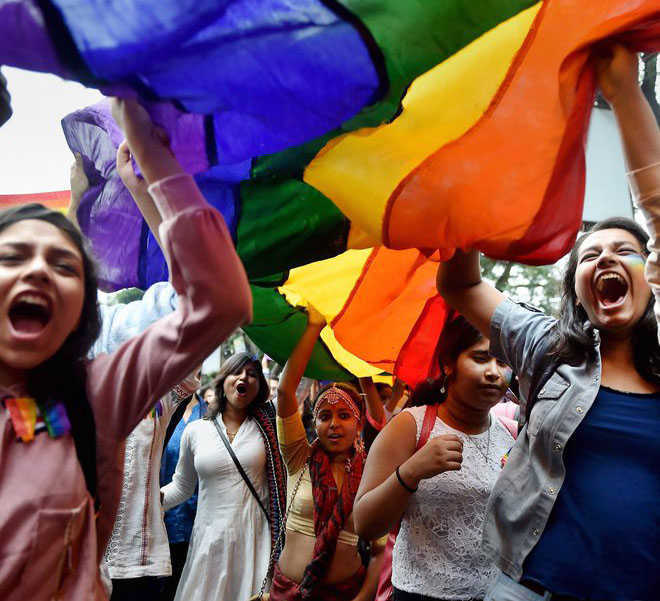Satya Prakash
Tribune News Service
New Delhi, January 8
Noting that social morality changes with the passage of time, the Supreme Court today referred to a larger Bench a petition challenging Section 377 of the Indian Penal Code that criminalises gay sex in the country.
“A section of people or individuals who exercise their choice should never remain in a state of fear. When we say so, we may not be understood to have stated that there should not be fear of law because fear of law builds civilised society. But that law must have the acceptability of the constitutional parameters. That is the litmus test,” said a three-judge Bench headed by Chief Justice of India Dipak Misra.
(Follow ; and )
Sending it to a larger Bench, the court said the decision in Suresh Kumar Kaushal’s case (2013) that reversed Delhi High Court’s verdict to de-criminalise gay sex required reconsideration.
Regarding another petition on the issue pending before another larger Bench, the CJI said that was a curative petition that stood on a different footing. It directed that a copy of the petition be served on the Union of India to enable it to be represented in the matter.
The order came on a petition filed by Navtej Singh Johar and four other eminent gay persons who have challenged the validity of the British-era law as affected persons. Now it’s for the CJI to take a decision on the administrative side to set up an appropriate Bench.
“Social morality also changes from age to age. The law copes with life and accordingly change takes place. The morality that public perceives, the Constitution may not conceive of. The individual autonomy and also individual orientation cannot be atrophied unless the restriction is regarded as reasonable to yield to the morality of the Constitution,” it noted.
“What is natural to one may not be natural to the other, but the said natural orientation and choice cannot be allowed to cross the boundaries of law and as the confines of law cannot tamper or curtail the inherent right embedded in an individual under Article 21 (right to life and liberty) of the Constitution,” it said in its order.
Senior counsel Arvind Datar told the Bench on behalf of the petitioners that he did not intend to challenge that part of Section 377 that related to carnal intercourse with animals and would confine his arguments to consenting acts between two adults.
Datar said, “Section 377, in so far as it destroys individual choice and sexual orientation, cannot be regarded as a reasonable restriction on the exercise of one’s fundamental rights.” The CJI’s Bench noted that consent between two adults had to be the primary precondition, otherwise children would fall prey to the possible decriminalisation of gay sex. Protection of the children in all spheres had to be guarded and protected, it said.
Datar and senior counsel Kapil Sibal relied on the August 2017 verdict by a nine-judge Constitution Bench that ruled that sexual orientation and choice was a part of right to privacy guaranteed under Article 21 of the Constitution.
“Sexual orientation is an essential attribute of privacy. Discrimination against an individual on the basis of sexual orientation is deeply offensive to the dignity and self-worth of the individual. Equality demands that the sexual orientation of each individual in society must be protected on an even platform. The right to privacy and protection of sexual orientation lie at the core of the fundamental rights guaranteed by Articles 14 (right to equality), 15 (right to non-discrimination) and 21 (right to live with human dignity) of the Constitution.”
Unlock Exclusive Insights with The Tribune Premium
Take your experience further with Premium access.
Thought-provoking Opinions, Expert Analysis, In-depth Insights and other Member Only Benefits
Already a Member? Sign In Now










